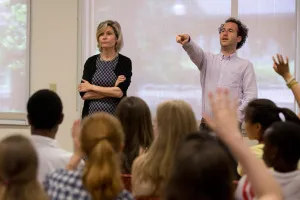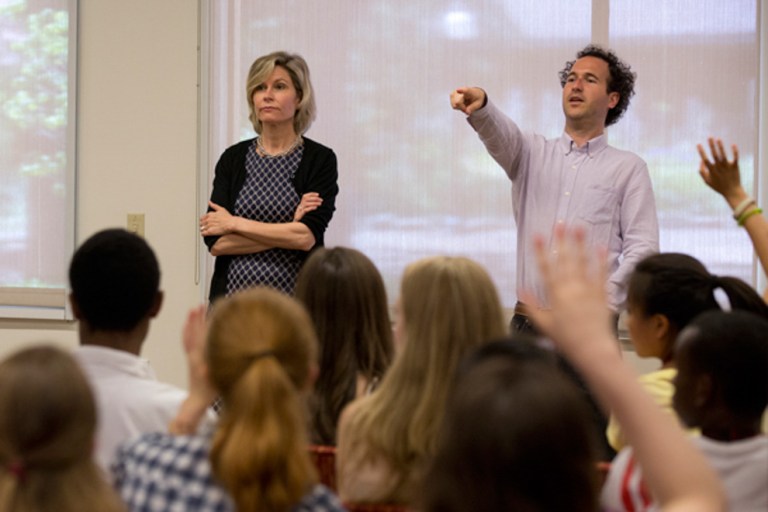
(MIKE ABBOTT/Stanford News Service)
In line with Stanford’s recent attempts to reaffirm the place of the humanities on campus, the University is reaching beyond its current student body and establishing that commitment to those who have not yet arrived. Stanford’s Summer Humanities Institute (SHI) functions as an intensive three-week summer program in which high school students come to Stanford and explore their interests in various humanities courses.
The program began operations a few years ago with the aim of exposing talented students to the experience of rigorously studying the humanities with tenured Stanford faculty, with courses “meant to introduce… kids to college level material and college level exploration,” according to Debra Satz, the Senior Associate Dean of the Humanities and Arts, Professor of Ethics in Society and (by courtesy) Political Science who initially conceived of SHI.
In addition, the program serves “to encourage more students who had strong interest in the humanities to consider Stanford when they applied for college,” said SHI director Dan Edelstein, who is a Professor of French and (by courtesy) History, and currently a visiting professor at Princeton University.
The three-week courses, attended primarily by rising high school seniors and juniors, are modeled after courses that would be offered to current Stanford undergraduate students. Topics include humanities disciplines such as History, Philosophy and Literature.
“It was a three week program…so all the information of a 10-week course was squeezed into a three-week course, so it was…pretty intense,” recalled current Stanford freshman Ibrahim Bharmal ’18. Bharmal attended SHI as a rising senior in 2013, taking “Philosophy and Literature” with Professors Lanier Anderson and Joshua Landy.
Due to the brevity of the program, Satz found that the courses cannot go as in depth as their typical Stanford analogs, and neither was his final written assignment as demanding.
According to Mohit Mookim ’18, an SHI classmate of Bharmal, there were 50 students enrolled in the course, 30 of whom were fellow rising seniors. Of the 30 students who would potentially apply to college in the months following the camp, according to both Mookim and Bharmal, 11 are currently enrolled at Stanford.
“We saw a surprising number be admitted and then come to Stanford,” Edelstein said, referring to those who attended SHI the same year that Bharmal and Mookim did. Edelstein also noted that the percent of admitted students who ultimately decide to come to Stanford is higher than that of typical admits.
“The kind of student who would apply to this sort of program tends to be already very motivated and tends to be a high academic performer,” he said.
The admissions criteria for the program are loosely based around those of Stanford, in addition to a demonstrated interest in the humanities and an ability to write. The program, which is entirely need-blind in regards to financial aid, looks for applicants who “are on the level of our Stanford undergraduates,” according to Satz.
Bharmal and Mookim both indicated that at the time they applied to SHI, a potential boost in their chance of admission to Stanford was not a motivating factor.
“The main reason why I did it…was mostly just to see if I could perform at a college level,” Bharmal said.
While at SHI, students do get the chance to interact with Stanford admissions officers. During an event towards the camp’s end, SHI students were given a tour and a talk.
“There was an actual admissions officer that recognized you as more than just an average [prospective student]…they just talked about getting in and certain things that might be helpful in the humanities specifically,” Mookim said. “I think the officer specifically pointed at that you’re helped by not only going to this camp, but saying you’re a humanities student at a place where in some ways [they’re] trying to expand the humanities.”
The program culminates in the third week with a 10-page research paper. After submitting the project and finishing the camp, each student receives an evaluation from his or her professor, meant to reflect on the student’s work during and progress in the course. Students often use the evaluations as a letter of recommendation when applying to college.
“Towards the end of it they [mentioned], ‘We’re going to issue these letters of [recommendation], and when you apply to college you can definitely use them,’” Bharmal said, who chose to focus on a synthesis of literary theory for his project.
Mookim, who didn’t personally use his evaluation from a Stanford professor as a letter of recommendation, knew multiple students who did.
“You email the professors, and they would do it in a heart beat,” Mookim said.
“We’ve had conversations [with admissions officers] about what the program consists of,” Edelstein said. “They often will…see the letters that get submitted from our students so they’re just curious about the details of the program.”
“I mean, does it help their chances? I don’t know. I think that they’re able to talk about why they like the humanities at Stanford so they can be a little more specific in their [applications]…They’ve also done work that a lot of high school students with an interest in the humanities have never done before…I think they have some solid achievements they can point to that maybe other students with interests in the humanities don’t have,” Edelstein added.
“We did not create this program as some kind of secret back door to admissions to Stanford,” Satz noted. For Satz, if enrollment at SHI leads to an increased chance at admission to Stanford, it is not causation but correlation.
“We don’t take students into this program who we think wouldn’t be very competitive for Stanford admissions.”
Contact Sam Premutico at samprem ‘at’ stanford.edu.
